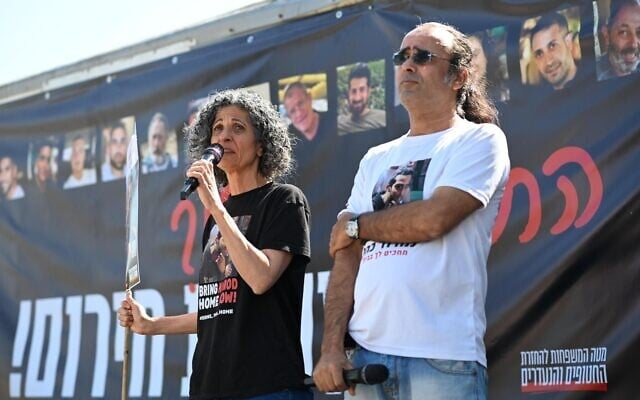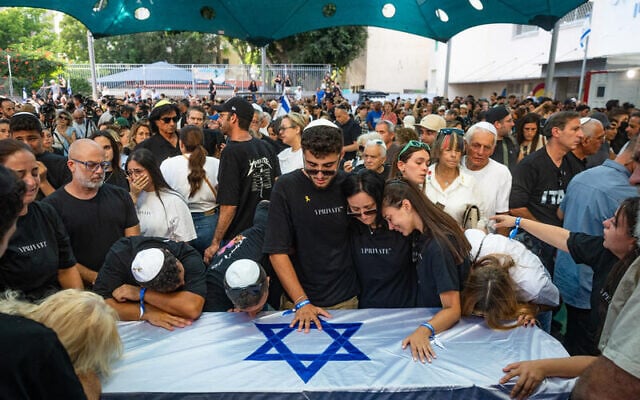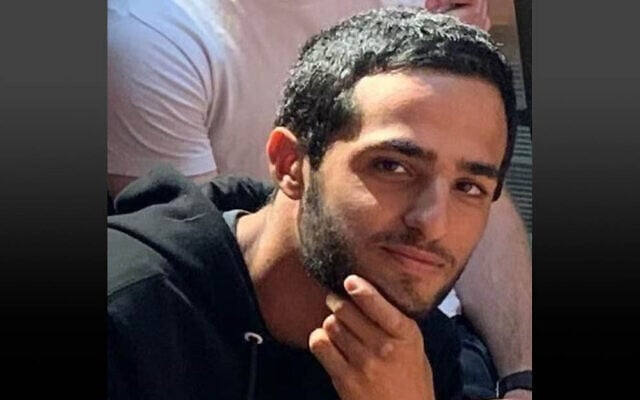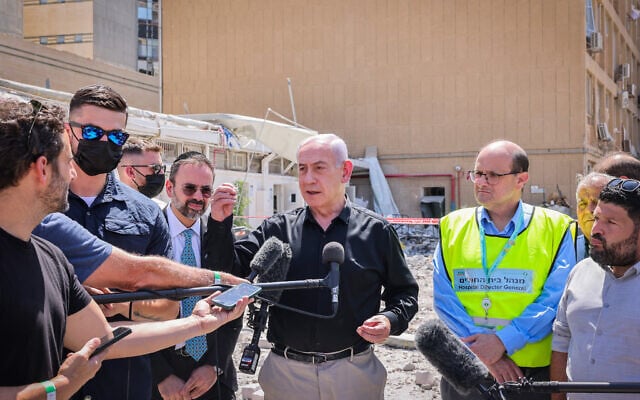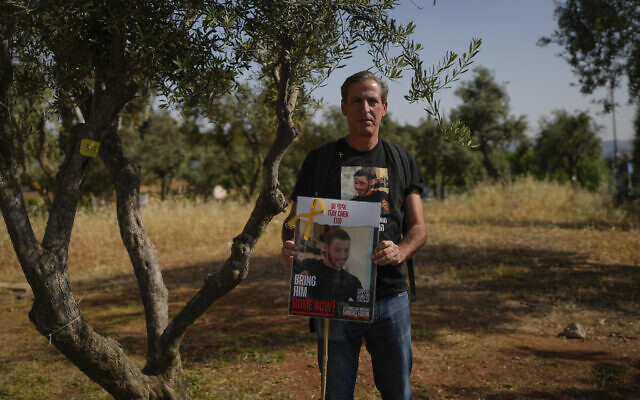


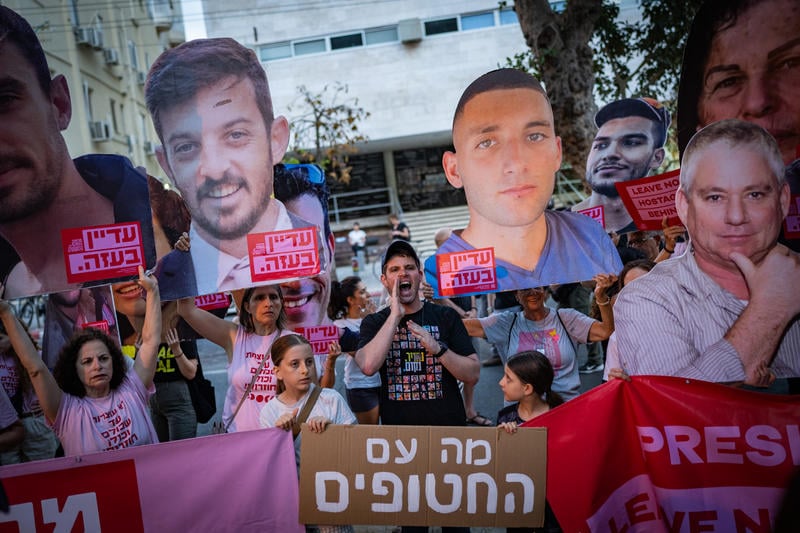
Families of hostages held in Gaza hope the ceasefire with Iran, which went into effect on Tuesday will mark a turning point — one that could lead to a truce with Hamas and finally bring their loved ones home.
Israel and Iran agreed to halt hostilities after trading blows for just 12 days, but the Gaza war has dragged on ever since it was sparked by the Hamas onslaught of October 7, 2023, when thousands of terrorists invaded southern Israel to kill 1,200 people and take 251 hostages.
“The Israeli government started a war with Iran without finishing the one still ongoing in Gaza,” said Viki Cohen, mother of captive soldier Nimrod Cohen.
Speaking at her home in Rehovot following the Iran ceasefire, she said she hoped the government would now secure the release of the hostages.
Israel said its sweeping airstrikes on Iran’s nuclear program and military leadership aimed to prevent the Islamic Republic from realizing its avowed goal to destroy the Jewish state. Iran retaliated with deadly missile strikes that caused major destruction in Israeli cities.
During the war with Iran, as air raid sirens wailed and military officials gave televised addresses, Cohen said she felt “as if no one was talking about [the hostages], as if they had been forgotten.”
As soon as the sirens fell silent, the hostages’ families resumed issuing statements and organizing rallies demanding their release.
“Those who are capable of reaching a ceasefire with Iran can also put an end to the war in Gaza,” the Hostages and Missing Families Forum said in a statement. “Ending the operation in Iran without using it to return all the hostages would be a grave diplomatic failure.”
Viki Cohen and her husband regularly join in demonstrations, holding up signs or photos to demand the release of the hostages, more than 20 months after the start of the war.
On Tuesday, they were in Tel Aviv to attend the funeral of Yonatan Samerano, a 22-year-old whose body was snatched from southern Israel and taken to Gaza after terrorists murdered him during the Hamas onslaught.
The IDF announced earlier this week that it had recovered his and two other bodies of hostages from Gaza. At the burial, Viki embraced Yonatan’s mother Ayelet.
Viki’s son, Nimrod, was 19 when he was kidnapped by Hamas from his tank, which was stationed on the Gaza border.
“Nimrod enlisted out of conviction, he was a volunteer fighter with an ideal of defending his country and its citizens,” she told AFP. “Now his country is abandoning him and not doing everything necessary to bring him back.”
In her son’s bedroom, his figurine collections stand neatly arranged on the shelves.
“I even miss the usual mess in his room,” she said with a smile.
She showed Nimrod’s Rubik’s Cube, which the army found in his tank and returned to her. As he never went anywhere without it, she had a Rubik’s Cube added to the T-shirts she had printed, bearing her son’s picture.
“Nimrod is a wonderful child, a child full of light, very sensitive, with a very rich inner world… He is always ready to help, he never complains about anything,” she said. “I hope that’s what’s helping him survive.”
The only visual proof of life she has had of her son was a video of hostages released by Hamas. Though his face was blurred, she recognized him by a tattoo on his forearm.
Viki said she feels “immense frustration at having gotten to this point.”
The hope of seeing her son again is what keeps her going. “I’ve been picturing his return since October 7,” she said.
At the funeral of Yonatan Samerano, among portraits of the hostages and yellow ribbons — the symbol of the movement calling for their return — many of their relatives shared her feelings.
“Hamas is at its weakest point. It’s possible to propose a deal that we, as Israelis, could accept,” said Ruby Chen, father of slain captive soldier Itay Chen.
Prime Minister Benjamin Netanyahu has rejected truce-hostage deal proposals that would require Israel to permanently end the war in Gaza without Hamas having been vanquished.
Hamas, whose backers Iran and fellow Iran-backed group Hezbollah have emerged weakened from war with Israel, demands that any truce-hostage deal include a permanent ceasefire in Gaza.
“I’d like to believe that Netanyahu and his government understand that recent changes in the Middle East are opening a window of opportunity,” said Chen. “After defeating Iran, after defeating Hezbollah, now is the time to bring everyone else home and end the conflict in Gaza as well.”
Terror groups in the Gaza Strip are holding 50 hostages, including 49 of the 251 abducted by Hamas-led terrorists on October 7, 2023. They include the bodies of at least 28 confirmed dead by the IDF. Twenty are believed to be alive and there are grave concerns for the well-being of two others, Israeli officials have said. Hamas is also holding the body of an IDF soldier killed in Gaza in 2014.
Hamas released 30 hostages — 20 Israeli civilians, five soldiers, and five Thai nationals — and the bodies of eight slain Israeli captives during a ceasefire between January and March, and one additional hostage, a dual American-Israeli citizen, in May as a “gesture” to the United States.
The terror group freed 105 civilians during a weeklong truce in late November 2023, and four hostages were released before that in the early weeks of the war. In exchange, Israel has freed some 2,000 jailed Palestinian terrorists, security prisoners, and Gazan terror suspects detained during the war.
Eight hostages have been rescued from captivity by troops alive, and the bodies of 49 have also been recovered, including three mistakenly killed by the Israeli military as they tried to escape their captors, and the body of a soldier who was killed in 2014.

